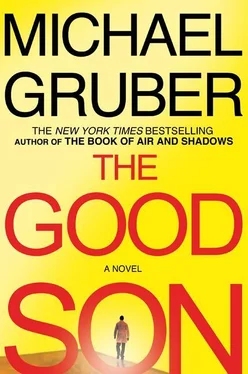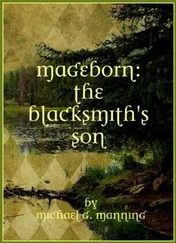I have become the dust in her street.
O wind, let me down, I don’t want to fly anymore.
As it happened, I came out of the clouds at about two thousand feet, in rain, and of course I couldn’t see much and I popped the chute and the MT-5 opened up above me and I was flying. A modern military parachute is basically a controllable kite; subject to the wind, you can fly it as long as you like and land on a crate of eggs without much damage. So I watched my GPS, headed toward a tributary of the Swat River, and found it all right; I could see the white froth of its passage over rocks, and I landed nicely on a little gravelly beach.
I pulled my pack shovel from my rucksack, buried the flight suit and chute and helmet and boots, tossed the shovel in, and kicked gravel into the hole. I took my Stechkin in its wooden holster from the pack, strapped it on under my kameez, and wrapped my blankets over my shoulders against the thin rain. I found a sheltered place among the rocks that bordered the river, wrapped myself tightly in my blankets, and fell asleep.

In the morning sheep awakened me and for a second I was back in my youth, when I was herding for the jihad and the sound of sheep was always in my ears, especially in spring when the ewes call constantly to their new lambs, as they were now. I hoisted on my rucksack and knotted my blankets around my shoulders the way we do in that country and clambered up through the rocks until I came to a track on the east side of the river.
It was a good-sized flock, maybe eighty sheep guided by a middle-aged man and a boy. I approached the man and wished him peace and he did the same and I offered him a pinch of tobacco and a piece of newspaper and we both rolled and smoked and talked about sheep for a while. He was going to Kalam to sell his lambs and ram yearlings, and I said, “Brother, I see God is smiling on me today in meeting you.”
He asked me how so, and I told him that I too was going to Kalam, but to buy sheep, not sell them. My brother’s son was getting married this week in Paidara and I was going to give a feast for our whole clan, and if he would sell me half a dozen ewes and their lambs I would save a journey. He reflected on the providence of God and regretted that he was a poor man and could not give me a discount; I would have to pay the full Kalam market price, and he named a figure that, as an old shepherd myself, I reckoned was three times the sum that any sheep had ever sold for in any market from Herat to Lahore. I told him he had mistaken me for a rich man, or for someone in the market for sheep that had been especially trained to walk on wires or could talk in human tongues. I was only interested in ones that could be eaten, and I named a lower price.
He said that perhaps I had mistaken him for a charitable trust, but no, he was just a poor shepherd trying to earn a living, and I had to hear a story about the miseries of shepherding in these dark times, and we went around the block for a while in the good old way and finally I closed the deal for half a dozen ewes and their lambs for about 50 percent over market, and these the least desirable sheep in the flock, bot-flied, dull-eyed, and thin.
I used my Pashtun knife to cut a crook from a willow thicket and walked off with my flock toward Paidara. I had landed, by design, about ten klicks away, and dragging along with my sheep it took me until early afternoon to climb the high valley trail to the first mujahideen checkpoint outside the village. This was four beards with AKs and one on a Toyota pickup with a mounted Russian heavy machine gun. We had a nice chat, and I offered one of my ewes and her lamb as a gesture of my sincere support for the jihad. I passed through with smiles and good wishes.
Paidara was what I expected, a crumbled brick hamlet with some signs of recent prosperity: a shop selling cheap consumer goods, electric generators, fewer beggars than average, and scores of Taliban driving the narrow streets in mud-spattered brand-new trucks and SUVs. The jihad was good business, apparently. I asked a man on the street where the butchers were and sold off my sheep for about half what I’d paid for them. In the necessary chat with the butcher and his pals, and the curious Taliban passers-by, I gave a name and clan lineage out of Kunar in Afghanistan, which more or less protected me from undue suspicion. People cross the border all the time, of course, and when they found I was just a shepherd, not too bright, and had no smuggled goods, they all lost interest.
I went to the tea shop and drank sweet milky tea until it was coming out of my ears, and picked up the town gossip. Big doings recently in Paidara, I learned. The place had been Taliban for quite a while, and they were digging in, fortifying houses and tunneling; the Pakistani army had announced a truce, but no one trusted the Pakistani army, well known to be in the pay of the Americans. Besides that, Arab mujahideen had arrived, there were hostages, money had flowed, and more would flow from this. I asked where they kept the infidels. Oh, that was another good story. One of the infidels had grabbed a weapon and killed the Taliban emir and his chief men, and in the affray the Arabs had stolen the hostages. Did I know one of them was a witch? Yes, she had bewitched many in the village, telling them their dreams and what they meant, and some said she had bewitched the new emir, Idris Ghulam, of whom I had possibly heard, a local boy whose valor was famous throughout the Swat. He would deal with the treacherous Arabs, although there were complications having to do with a weapons factory the Arabs had set up in the village, and no one wanted to lose the money that brought in. Negotiations between the two groups was ongoing, and everyone hoped that soon they would start to chop heads again; everyone was looking forward to the fun.
Sheep for feasting were getting scarce, and I learned how much I’d gotten ripped off on my flock. Much laughter here-all Pashtuns love a fool. A man named Abdur took pity on the poor jerk me and offered a room for the night. I said I would be glad to accept, but I had a family duty. My aunt had recently been widowed in a village not too far away and I had promised I would bring her back to the family in Kunar Province. I couldn’t impose on his hospitality with another guest.
He dismissed this airily: of course you can invite her, another woman is nothing, you are both welcome. I thanked him sincerely, saying that God would remember his generosity and threw in the quote about the blessedness of charity to the wayfarer from the Qur’an. So that was all set. I’d snatch my mother, bring her back here veiled, and get on with the rest of the mission. I walked home with my new pal, and we sat on rugs in the main room of his house and were fed by silent black shapes, and we talked of the terrible times. My man had no real objection to the Taliban, at least they kept crime under control and he thought the government was too harsh when it tried to uproot them. Bombs! Artillery! Many innocents had died. But of course the Taliban were wicked as well; they demanded that all rents be paid into their hands and not to the rightful landlords, of which he was one, and they murdered anyone who objected. Yes, it was a terrible time, but with God’s help perhaps it would improve. Slowly, without seeming to, I turned the conversation to the captive infidels. I said I assumed the Arabs had them hidden away and no one knew where they were. Of course everyone knew; it was in the house of his wife’s cousin, which he was renting to the Arabs, who at least paid dollars to the landlord. And he told me more than I needed to know about the house, how much his wife’s cousin had paid for it, who had owned it before, and what improvements had been made since, and said his wife’s cousin was a fool like all his family, since the man could’ve gotten far more for such a fine house if he had only known how to bargain.
Читать дальше













